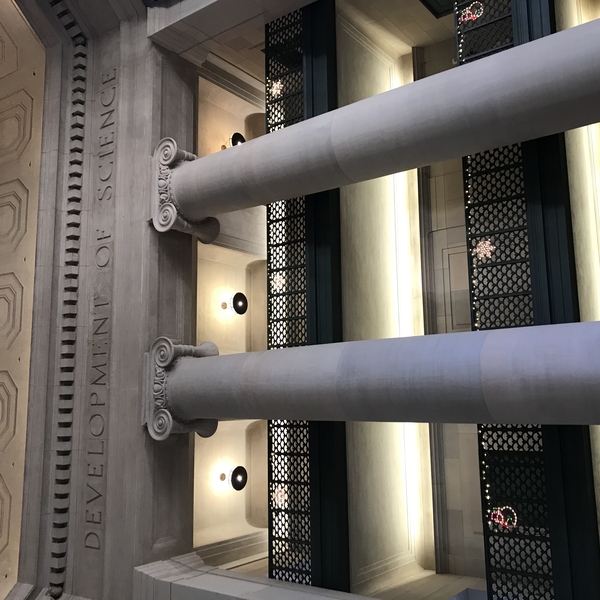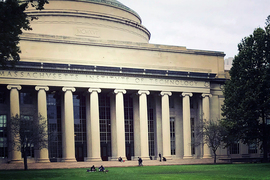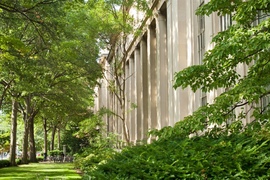The MIT School of Science has recognized 13 staff members with the 2021 Infinite Mile Award.
Staff are nominated for Infinite Mile Awards, presented annually since their creation in 2001, by their peers for going above and beyond in their roles and making MIT a better place. Their support for the School of Science, and the Institute community as a whole, has been invaluable, especially as we pass the one-year mark of work-from-home and social distancing due to the Covid-19 pandemic.
The following are the 2021 School of Science Infinite Mile winners.
- Rebecca Chamberlain, administrative officer in the Department of Biology, was nominated by Professor Stephen Bell because Chamberlain “makes things easier for everyone in the department and this has never been more true than in this trying year. Even as she has taken on so much more, she has continued to maintain a friendly, patient, and unflappable attitude that makes her all the more remarkable.”
- Janice Chang, academic administrator in the Department of Biology, was nominated by MIT Human Resources administrator Helene Kelsey because Chang is “truly exceptional, strives for perfection, and her skills and work ethic are recognized throughout the department. Janice has embraced the associated challenges with wisdom, a common-sense approach, dedication, goodwill, and a willingness to devote endless additional hours to the tasks at hand.”
- Emma Dunn, undergraduate programs assistant in the Department of Physics, was nominated by Academic Administrator Catherine Modica because, when campus closed, “it was Emma who came up with all the ideas we used to try to reach out to our students, […] tracking their arrivals at home to make sure they were safe, and creating and sending shipments of care packages to every undergraduate major to remind them that we were […] thinking about them and standing ready to help.”
- Jennifer Fentress, communications officer in the Department of Earth, Atmospheric and Planetary Sciences, was nominated by professor and EAPS department head Robert van der Hilst; associate professor David McGee; and staff colleagues Julia Keller, Megan Jordan, Angela Ellis, Maggie Cedarstrom, Brandon Milardo, and Scott Wade because Fentress “has helped advance the work of the school and MIT more broadly. At every opportunity, she ensures that the voices of EAPS research scientists are well-represented.”
- Laura Frawley, a lecturer in the Department of Brain and Cognitive Sciences, was nominated by Professor Michale Fee and staff colleagues Kate White and Kimberli DeMayo because Frawley “has dedicated so much time and effort into learning all the new tools and resources available to help faculty convert to remote learning. […] All in all, Laura has been a savior this year!”
- Brittany Greenough, an events planning assistant in the Picower Institute for Learning and Memory, was nominated by Picower Institute director and professor of brain and cognitive sciences Li-Huei Tsai and Administrative Officer William Lawson because, “[i]n this new, virtual environment, Brittany has taken it upon herself to be the resident expert with transitioning events to online formats.”
- Chhayfou Hong, a financial assistant in the Laboratory for Nuclear Science, was nominated by professors of physics Jesse Thaler, Mike Williams, Joseph Formaggio, and Philip Harris because “without Chai’s herculean efforts here, the IAIFI [NSF AI Institute for Artificial Intelligence and Fundamental Interactions] would not exist, and MIT would have missed out on housing one of the inaugural NSF AI institutes — and on $20 million in revenue over the next five years.”
- Beverly La Marr, a test engineer in the MIT Kavli Institute for Astrophysics and Space Research, was nominated by Kavli Institute director and professor of physics Robert Simcoe and principal research scientists Marshall Bautz, Ronald Remillard, and Gregory Prigozhin because La Marr “has played an essential part in MKI’s success in space with flagships, mid-sized, and small missions; and in fact, at this moment, three missions bearing her intellectual ‘fingerprints’ are all producing exciting scientific data from space. Her contributions to her colleagues are no less significant.”
- Brian Pretti, a facilities and operations administrator in the Department of Chemistry, was nominated by professor and department head Troy Van Voorhis and administrative officer Richard Wilk because Pretti “is someone who goes far above and beyond his usual call of duty. He is also a joy to work with, no matter the stress or difficulty of the situation. Brian exemplifies all of the qualities of someone who truly cares about the quality of his work and those individuals he supports. He has demonstrated an incredible commitment to the Department, and it is a better place because of him.”
- Alison Salie, senior fiscal officer in the Department of Biology, was nominated by professor and department head Alan Grossman because Salie “is a top-notch employee, well-respected across the department and Institute, and valued for her knowledge and expertise, common-sense approach, willingness to provide support and guidance at every turn, persistence, and never-ending goal to keep work flowing smoothly with limited administrative burden on faculty.”
- Amanda Trainor, a technical associate in the Department of Chemistry, was nominated by colleagues John Dolhun, Brian Pretti, Scott Ide, John Grimes, and graduate student Axel Vera because her “work on all aspects of various lab functions has been outstanding, from finishing her assigned responsibilities, to taking on unassigned work that needed to be done, [and] demonstrating a strong commitment to the well-being of the MIT community by going countless extra miles.”
- Joshua Wolfe, a technical instructor in the Department of Physics, was nominated by postdoc Alex Shvonski and lecturer Michelle Tomasik because Wolfe “goes above and beyond his prescribed duties because he cares holistically about creating an effective learning environment in our classes.”
- Macall Zimmerman, senior financial officer in the Department of Chemistry, was nominated by professor and department head Troy Van Voorhis and staff colleagues Richard Wilk and Tyler Brezler because Zimmerman “is someone who goes far above and beyond her usual call of duty. She is an excellent leader, manager, and mentor. She demonstrates an exceptional commitment to every aspect of her work and the staff whom she mentors. Our department is a better place with her in it.”
The 2021 Infinite Mile Award winners receive a monetary award. An in-person celebration will be held in their honor, as well as the 2021 Infinite Expansion Award winners, at a later date with their families, friends, and nominators.








